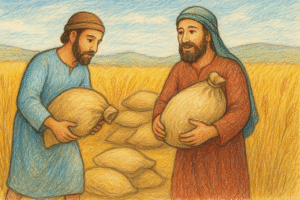There is a parable in the Eastern tradition that speaks of a poet—poets in the oriental culture are considered moral leaders, those who guide the people with their wisdom. For that reason, they are considered as men who have an important or divine mission. The poet in this parable was sad about his situation, because although he did good with his poetry, he received very little compensation and therefore he was very poor.
One day he decided to go to God to protest about his situation. When he came before God, God asked him, “What is the reason you are here? What brings you here?” The poet, without any introduction, began to complain about his situation, saying that he spends all his time doing good and yet he lives in poverty, while there are so many men who do little or no good or even do evil and yet are rich and well off. The poet ended by saying: “It’s not fair at all!”
God patiently answered him: “You should not complain because you have made a good choice by choosing to be a poet. Therefore, you should be happy, because your reward is greater than any wealth in this world. Your reward is the good that you do, which fills your soul with goodness and gives it satisfaction. Material goods only swell the body but pauperize the soul. Doing good is what truly enriches man.” The poet became thoughtful. He did not expect that answer, and God continued, “You have received a great talent from heaven and by choosing the vocation of a poet you have dedicated yourself to making that talent bear fruit. Do not look back, you have made a good choice, continue to do good and do not complain, for what you receive is much more valuable than the riches you do not receive.”
Sometimes even great souls, those who have preferred the things that enrich the person as a person rather than the person as someone in the world, are tempted to think like the poet, to regret the choice they have made, to feel frustrated by the little material or human reward they receive. Many times, what happens to them is what happened to Our Lord Jesus Christ, who received evil in exchange for the good He came to bring us.
This can happen not only when we choose a vocation to do good such as a nurse, a policeman, religious life, etc., but also when we deny ourselves in order to do good for someone else and then we are not rewarded as we expected. This parable teaches us that good works pay for themselves, so we should not seek to be rewarded for doing good. We can lose the good we receive for the good works we do, by falling into the temptation of doing good only to be rewarded and not for the act of doing good itself.
Doing good is what really satisfies us as human beings or as free persons, it is what beautifies our soul and this is exactly what Our Lord was referring to when speaking of the Pharisees. He tells His disciples that they should not do as the hypocrites do, who seek the reward here on earth; they miss the best part, which is the reward of doing good. Doing good makes the soul of the one who does it greater, and therefore the work of good pays for itself, because the one who practices good receives more than the one who benefits from the good deed of his neighbor.





